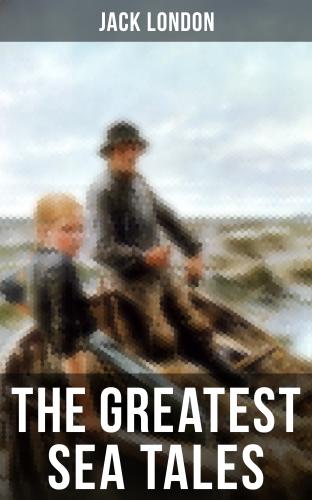The Greatest Sea Tales of Jack London. Jack London
that it diminished as slowly as it had arisen. After breakfast next morning, when I had hoisted Wolf Larsen’s body on deck ready for burial, it was still blowing heavily and a large sea was running. The deck was continually awash with the sea which came inboard over the rail and through the scuppers. The wind smote the schooner with a sudden gust, and she heeled over till her lee rail was buried, the roar in her rigging rising in pitch to a shriek. We stood in the water to our knees as I bared my head.
“I remember only one part of the service,” I said, “and that is, ‘And the body shall be cast into the sea.’”
Maud looked at me, surprised and shocked; but the spirit of something I had seen before was strong upon me, impelling me to give service to Wolf Larsen as Wolf Larsen had once given service to another man. I lifted the end of the hatch cover and the canvas-shrouded body slipped feet first into the sea. The weight of iron dragged it down. It was gone.
“Good-bye, Lucifer, proud spirit,” Maud whispered, so low that it was drowned by the shouting of the wind; but I saw the movement of her lips and knew.
As we clung to the lee rail and worked our way aft, I happened to glance to leeward. The Ghost, at the moment, was uptossed on a sea, and I caught a clear view of a small steamship two or three miles away, rolling and pitching, head on to the sea, as it steamed toward us. It was painted black, and from the talk of the hunters of their poaching exploits I recognized it as a United States revenue cutter. I pointed it out to Maud and hurriedly led her aft to the safety of the poop.
I started to rush below to the flag-locker, then remembered that in rigging the Ghost. I had forgotten to make provision for a flag-halyard.
“We need no distress signal,” Maud said. “They have only to see us.”
“We are saved,” I said, soberly and solemnly. And then, in an exuberance of joy, “I hardly know whether to be glad or not.”
I looked at her. Our eyes were not loath to meet. We leaned toward each other, and before I knew it my arms were about her.
“Need I?” I asked.
And she answered, “There is no need, though the telling of it would be sweet, so sweet.”
Her lips met the press of mine, and, by what strange trick of the imagination I know not, the scene in the cabin of the Ghost flashed upon me, when she had pressed her fingers lightly on my lips and said, “Hush, hush.”
“My woman, my one small woman,” I said, my free hand petting her shoulder in the way all lovers know though never learn in school.
“My man,” she said, looking at me for an instant with tremulous lids which fluttered down and veiled her eyes as she snuggled her head against my breast with a happy little sigh.
I looked toward the cutter. It was very close. A boat was being lowered.
“One kiss, dear love,” I whispered. “One kiss more before they come.”
“And rescue us from ourselves,” she completed, with a most adorable smile, whimsical as I had never seen it, for it was whimsical with love.
Adventure
Chapter I. Something to Be Done
Chapter V. She Would a Planter Be
Chapter VII. A Hard-Bitten Gang
Chapter IX. As Between a Man and a Woman
Chapter X. A Message From Boucher
Chapter XI. The Port Adams Crowd
Chapter XII. MR. Morgan and Mr. Raff
Chapter XIII. The Logic of Youth
Chapter XV. A Discourse on Manners
Chapter XVI. The Girl Who Had Not Grown Up
Chapter XVII. “Your” Miss Lackland
Chapter XVIII. Making the Books Come True
Chapter XXII. Gogoomy Finishes Along Kwaque Altogether
Chapter XXIII. A Message From the Bush
Chapter XXVI. Burning Daylight
Chapter XXVII. Modern Duelling
| “We are those fools who could not rest In the dull earth we left behind, But burned with passion for the West, And drank strange frenzy from its wind. The world where wise men live at ease Fades from our unregretful eyes, And blind across uncharted seas We stagger on our enterprise.” “THE SHIP OF FOOLS.” |
Chapter I.
Something to Be Done
He was a very sick white man. He rode pick-a-back on a woolly-headed,
